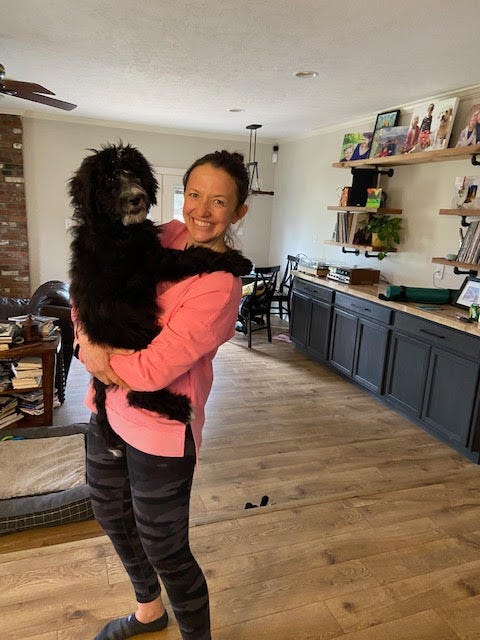In one of my favorite books, Falling Upward, the author, Richard Rohr separates life into three boxes: order, disorder, and reorder. He explains them like this:
A sense of order is the easiest and most natural way to begin; it is a needed first “container.” But this structure is dangerous if we stay in its safe confines too long. It is small and self-serving. It doesn’t know the full picture, but it thinks it does. “Order” must be deconstructed by the trials and vagaries of life. We must go through a period of “disorder” to grow up.
Only in the final “reorder” stage can darkness and light coexist, can paradox be okay. We are finally at home in the only world that ever existed. This is true and contemplative knowing. Here death is a part of life, failure is a part of victory, and imperfection is included in perfection. Opposites collide and unite; everything belongs.
Most of us, hopefully, start out in order. As children, developmentally, we need the structure and stability that comes with order. Some of us get stuck there (see: a fundamentalist of any stripe). Part of growing up is disorder. Disorder typically happens to us. We don’t need to go seeking it; life is full of disorder. Some of us get stuck here too (Rohr says often more progressive types get stuck in disorder because they see any kind of structure as evil or bad). Rohr says that the fortunate few progress to the reorder stage where everything is integrated. He refers to these people as truly saved or enlightened.
Side note: if you want a deeper dive into the three boxes and Rohr in general, listen to this On Being episode.
I see this pattern throughout the great spiritual traditions and, especially, indigenous rites of passage (as well as, honestly, most of the great literature or cinema I’ve ever read or seen). We need the container first, then we need to break out of the container, test our boundaries, figure out what we value versus what our family/culture values, and then, after at least some suffering typically, we - even just occasionally - are able to accept the paradox and mystery of life.
So it seems to me that Covid has induced a time of disorder - globally. As we contemplate a “new normal” (whatever that means), it feels like everything should be on the table in terms of what we decide to include in the reordering. I read a think piece a week about how, after the pandemic, employers who don’t get on the flexibility train will lose talent and be left behind. I keep wondering about how we can translate that to our larger societal problems? The last year has revealed, not only the scale of the problems we face, but also what we’re capable of. We can learn a whole new language, make huge scientific leaps, rethink entire ways of doing things on the fly. It feels like such a potential tipping point for change.
But also, even writing that, I feel exhausted. In the last week, we’ve passed the year anniversary of the pandemic and had seven (SEVEN) mass shootings in America alone, not to mention the tragedies going on around the globe. Is this how oppression and systemic problems perpetuate - by keeping us too exhausted, overworked, busy, or depressed to demand change? If I’m exhausted - a very privileged white lady - I can literally only imagine how oppressed people groups feel.
I don’t have any tidy answers here, but I wonder if Rohr’s three boxes can be an invitation for us societally. We want to move to a place of reorder after the disorder. The danger for us societally after disorder hits, just as it is for us individually, is to either move backwards into a more rigid order (i.e. fundamentalism) or to stay stuck in disorder.
I also think we probably, as individuals, need to be more focused on what fires us up. For me, its environmental issues. For my friend whose daughter was in a school shooting, its gun control. For some neighbors, its discrimination in our schools and community. For a friend at church, it’s the mental health crisis. I care about all of those things too, but I spread my outrage and energy too thin when I try to be an activist about too much. I’d rather go deep on one specific issue then broad on twelve issues - and with that approach, I think there is more opportunity for impact and less likelihood of burnout.
We have to look to the leadership on the margins for how to proceed. Who are you listening to and learning from that fits in that camp? I want to do better about the diversity of people I’m sitting under and listening to, so leave your suggestions in the comments - and we can learn from each other.
Rants and raves
👍 Greenlights. So basic, I know, but it is actually really good, especially on audio.
👍 Refinancing our house this week. This was a boring adulting decision, but with interest rates at supposed 4000 year lows, it was worth the annoyance and will save us thousands over the course of our loan. I used these calculators to do the math because our rate was already pretty low beforehand.
👍 IFS work. One of my yin yoga teachers offers Internal Family Systems group work. I had dabbled in IFS in therapy and liked it, so I signed up for a round of this back in the fall. It was super helpful and informative to dig into some of the ways I’ve been stuck. The group approach makes it really affordable, and I can’t recommend the methodology or her style more highly.
👍 Grant got his first vaccine on Tuesday. It really is miraculous that around a year after the start of the pandemic for most of us, many of us are getting vaccines. I can hardly think about it without getting teary. Here’s what I said on the ‘gram:
Stuff worth sharing this week
I’ve been trying to read more about the Asian American experience because, shame on me, I hadn’t thought a ton about it prior to Covid and the former President’s racist rhetoric. This interview was super enlightening on the subject - and how this is a longstanding problem in America but also in what ways this recent surge is different.
I keep running up against stuff like this that reminds what I know/experience to be true: restricting things only makes them more attractive and/or comes out sideways in the form of other problems. I mean, I’m nearly 40 and still having to remind myself of this. But it gets really hard as a parent who cares deeply about the impact of our food choices to know what the right thing to do is. Urgh. Just trust me and read the whole thing.
Seasonal view of the week
We are really trying to lean into #puppyseason around here. It’s amazing what you don’t have time to do (e.g. Twitter, TV, Instagram, laundry) when you’re on constant potty walks and puppy entertainment duty.
Cheers to figuring out that reordering thing!
Sara






Sara, this is an excellent post this week. Thank you.
"I read a think piece a week about how, after the pandemic, employers who don’t get on the flexibility train will lose talent and be left behind." This struck me. I see it in the discussion of schools too, that if we don't get back to it right away kids will "fall behind." Fall behind what? What if we all just agreed to shut things down for a year, set the emergency brake, all of it, and sort out where we are, how we got here, and what we need to do to make things right. That seems to me the hard question, and the one we aren't doing a very good job of answering. I read this morning that the CDC is still strongly advising against people not traveling, and yet I can rattle off names from my very small circle of people who are, and others who are chomping at the bit to do so.
I think you are right, though. So much of this is a smokescreen to keep us exhausted and disengaged. It's so hard not to be.